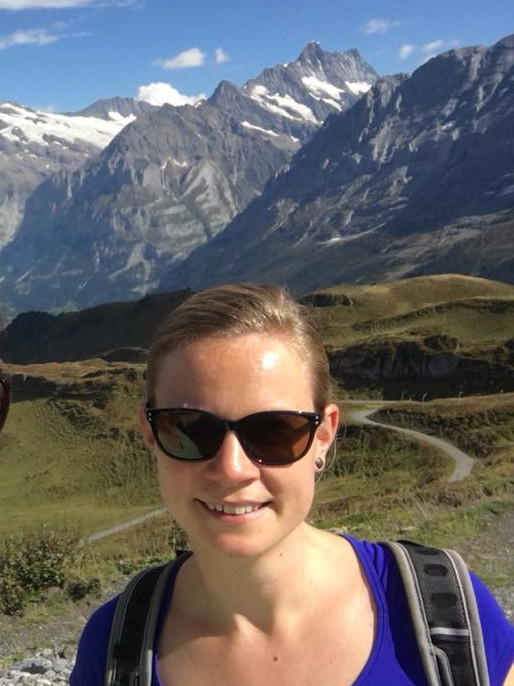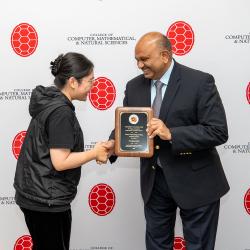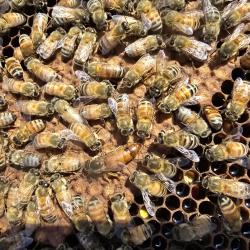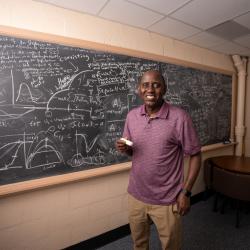From Seattle to Switzerland
Anne Jorstad (Ph.D. ’12, applied mathematics & statistics, and scientific computation) leads the data team at Switzerland’s national science agency.

Anne Jorstad was born and raised in a Seattle suburb and spent much of her 20s on the East Coast. So when the University of Maryland alum received a postdoc offer in Switzerland, she decided it would be fun to live abroad for a little while.
“When I got the postdoc in Switzerland, I thought, ‘I’ll do that for two years, come back to the U.S. and move on with my career,’” said Jorstad (Ph.D. ’12, applied mathematics & statistics, and scientific computation). “But it turns out that Switzerland is really nice, so I didn’t come back.”
Jorstad now leads the data team at the Swiss National Science Foundation (SNSF), the largest state agency to fund research in Switzerland. Her team of eight data scientists and statisticians is dedicated to identifying trends, removing bias and increasing efficiency in the funding and review of research.
“We are lucky because Switzerland invests a lot of money into research and we have an entire team dedicated to data analysis,” Jorstad said. “I don’t think such a large team exists at any other public funding agency in the world.”
Jorstad’s commitment to equity and affinity for data-based decisions—two qualities she honed during her time at UMD—have served her well in this leadership role.
Promoting inclusion in STEM
While looking into applied math Ph.D. programs in 2007, Jorstad felt that many schools were merely tacking applied math principles onto a pure math curriculum. She wanted something more practical and interdisciplinary and found it at UMD.
“The fact that there was an applied math program that wasn’t just pure fluid dynamics, but was actually applying math to other disciplines, is really what interested me,” she said. “I think for people like me who want to do something useful with math, the UMD program is an amazing fit.”
While Jorstad worked on her doctorate at UMD, she spent two summers interning at the Johns Hopkins Applied Physics Laboratory. There, she enjoyed using math for good—for example, one of her projects involved developing a computational geometric model of a human heart, with the goal of designing a tool surgeons could use to practice complex surgeries before operating on a patient.
Jorstad also joined UMD’s Graduate Student Government (GSG), taking an interest in policies that could make science, technology, engineering and mathematics (STEM) programs more inclusive. As a woman in math, she was keenly aware of the biases in academia; GSG helped expose her to other issues and nudged her career path toward policy.
“Wanting to counteract sexism was my entrance into government and policy, but then it became a broader awareness of all the ways in which the world is not fair to lots of people for various reasons; wanting to fight for not just equality, but equity; and wanting to promote diversity in programs,” she said. “I was interested in trying to make a difference.”
Through her advocacy with GSG, Jorstad helped to extend the health insurance coverage of Ph.D. students who were about to graduate and did not have insurance lined up for the summer. When it came time for her own graduation, she decided to move abroad and expand her worldview—and her reach—even further.
Heading to Lausanne
Jorstad moved to Switzerland in 2012 after accepting a postdoc position at EPFL, the Swiss Federal Institute of Technology in Lausanne. In this role, she led the development of computational tools that used geometry and image processing to compare neurons from young and old animals—research that could then be applied to understand degenerative brain disease in humans.
She then joined SNSF in 2014 and has been in Bern—a German-speaking region and the de facto capital of Switzerland—ever since. She studied French in high school and college and now takes German lessons, but most of her work is conducted in English.
Because SNSF is by far Switzerland’s largest national research funder, it’s a dream destination for data analysts.
“In the U.S. there’s the NSF and NIH and a bunch of other agencies, but in Switzerland, the SNSF funds everything and everybody,” she said. “Because it’s all in one database, we can ask and answer interesting questions about the research that’s being done in Switzerland.”
Jorstad’s team tapped into that database to analyze the number of women who applied for grants during the height of the COVID-19 pandemic. They found that fewer women applied during this period, and women in the social sciences and humanities were the most heavily affected. Though it’s illegal to collect data on race and ethnicity in Switzerland, Jorstad hopes to find data proxies that can help identify whether and where biases exist. She believes her work could lead to policies that strengthen diversity, equity and inclusion.
“When there’s no data to support that there is bias against different ethnicities, it’s hard to convince people that we need to work on this problem,” Jorstad said. “It’s very important to me that we try to figure out proxies for different types of diversity.”
Jorstad is also passionate about effective science communication. She encourages her team to write “data stories”—articles about their data analysis projects—that are intended for nonexperts
“Communicating to the public is a completely different skill set but it’s extremely useful,” she said. “It’s something we probably should all practice during our Ph.D.”
When she isn’t crunching data, Jorstad spends her time hiking Switzerland’s scenic trails, swimming in the Aare River that bisects Bern or playing oboe in a local wind ensemble that moonlights as a marching band in the summer. She’s also involved in local organizations that work to make a social impact.
Whether it’s in her community or in her work as a data scientist, Jorstad is committed to making a difference.
“At SNSF, we want to enable better policy decisions based on data,” she said. “Using evidence to make the world a better place is very important to me.”







